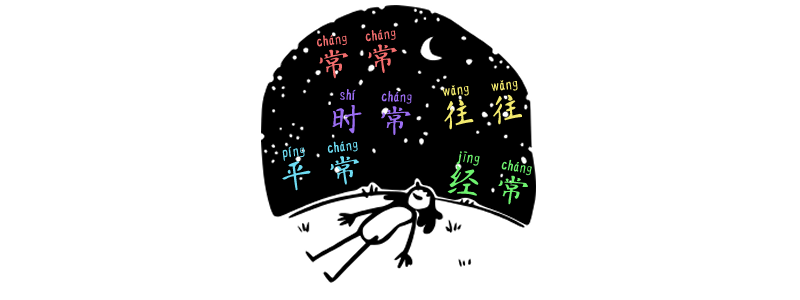Introduction:
常常 chángcháng, 经常 jīngcháng, 往往 wǎngwǎng, 平常 píngcháng, and 时常 shícháng share a similar meaning of “often” or “frequently,” but there are some differences in their usages and connotations.
常(常) cháng(cháng)
Adverb
常(常) cháng(cháng) means “often” and is always interchangeably with 经常 jīngcháng. However, it can sometimes imply a slightly more casual or less frequent occurrence than 经常 jīngcháng. To negate it, you must drop one 常 cháng, to make it become 不常 bùcháng.
他們公司常(常)加班他们公司常(常)加班
They often work overtime. (经常 ✅)
你應該常(常)運動你应该常(常)运动
You should exercise more often. (经常 ✅)
我我不常不常自己做飯自己做饭
I don’t often make my own meals. (经常 ✅)
Using 常 by itself with a simple verb indicates future frequent actions in spoken Chinese.
常聯絡常联络
Keep in touch!
常來玩常来玩
Let’s come hang out often!
經常/经常 jīngcháng
Adverb / Adjective
It implies a regular or frequent occurrence. It can be used in both positive and negative contexts. And if there’s a subject, it always goes after the subject.
When it uses as an adverb, it is interchangeable with 常常 chángcháng.
哥哥經常下班後就去超市買晚餐哥哥经常下班后就去超市买晚餐
My brother often goes to the supermarket after work to buy dinner. (Adv. 常常✅)
我不經常做運動我不经常做运动
I don’t do exercise often. (Adv. 常常✅)
參加客戶的派對是我們經常的活動参加客户的派对是我们经常的活动
Attending our clients’ parties is a regular activity. (Adj. 常常❌)
* Note that the function and grammar of 经常 jīngcháng and 时常 shícháng are almost the same, but 经常 jīngcháng implies a higher frequency or regularity than 时常 shícháng.
往往 wǎngwǎng
Adverb
往往 wǎngwǎng means “often” in the sense of “frequently” or “typically.” Unlike 常常 chángcháng often used to describe a habit or routine, 往往 wǎngwǎng implies a tendency and is often used to describe a pattern or trend. It suggests that something happens often in past experiences. Therefore, 往往 wǎngwǎng is used in certain conditions to mean how things can be or are like. It’s a conclusion or judgment of a regular situation.
You can always use 常常 chángcháng to replace 往往 wǎngwǎng, but not the other way around, since 往往 wǎngwǎng always needs a certain condition or situation.
我心情不好的時候往往會一個人去看電影我心情不好的时候往往会一个人去看电影
I tend to go to the movies alone when I’m in a bad mood. (Certain condition)
有錢人往往都喜歡買看不懂的畫有钱人往往都喜欢买看不懂的画
Rich people often like to buy paintings that they can’t understand. (Judgment of a regular situation)
台北的夏天往往很濕熱台北的夏天往往很湿热
Summer in Taipei is often very hot and humid. (Conclusion)
There’s no negation for 往往 wǎngwǎng, but you can negate the verb after 往往 wǎngwǎng.
學中文的人不往往覺得中文容易学中文的人不往往觉得中文容易 ❌
People who learn Chinese often don’t find it easy.
學中文的人往往不覺得中文容易学中文的人往往不觉得中文容易 ✅
People who learn Chinese often don’t find it easy.
平常 píngcháng
Adverb / Adjective
平常 píngcháng refers to the normal or ordinary state of things. It describes a regular or typical situation that is not particularly noteworthy or exceptional. When it uses as an adverb, it is interchangeable with 常常 chángcháng.
你平常週末都做什麼?你平常周末都做什么?
What do you usually do on weekends? (Adv. 常常✅)
我平常不吃早餐,因為我想多睡一點我平常不吃早餐,因为我想多睡点儿
I usually don’t eat breakfast because I want to sleep more. (Adv. 常常✅)
在法國蝸牛是很平常的菜在法国蜗牛是很平常的菜
Snails are a very common dish in France. (Adj. 常常❌)
There’s no negation for 平常 píngcháng, but you can negate the verb after 平常 píngcháng.
弟弟不平常開車去上班弟弟不平常开车去上班 ❌
Brother usually does not drive to work.
弟弟平常不開車去上班弟弟平常不开车去上班 ✅
Brother usually does not drive to work.
Practice
- I often take the subway to work
- He is often late for important matters.
- He doesn’t send us messages very often.
- This kind of thing is very common in the city.
- It’s a regular thing for her to forget to bring money.


